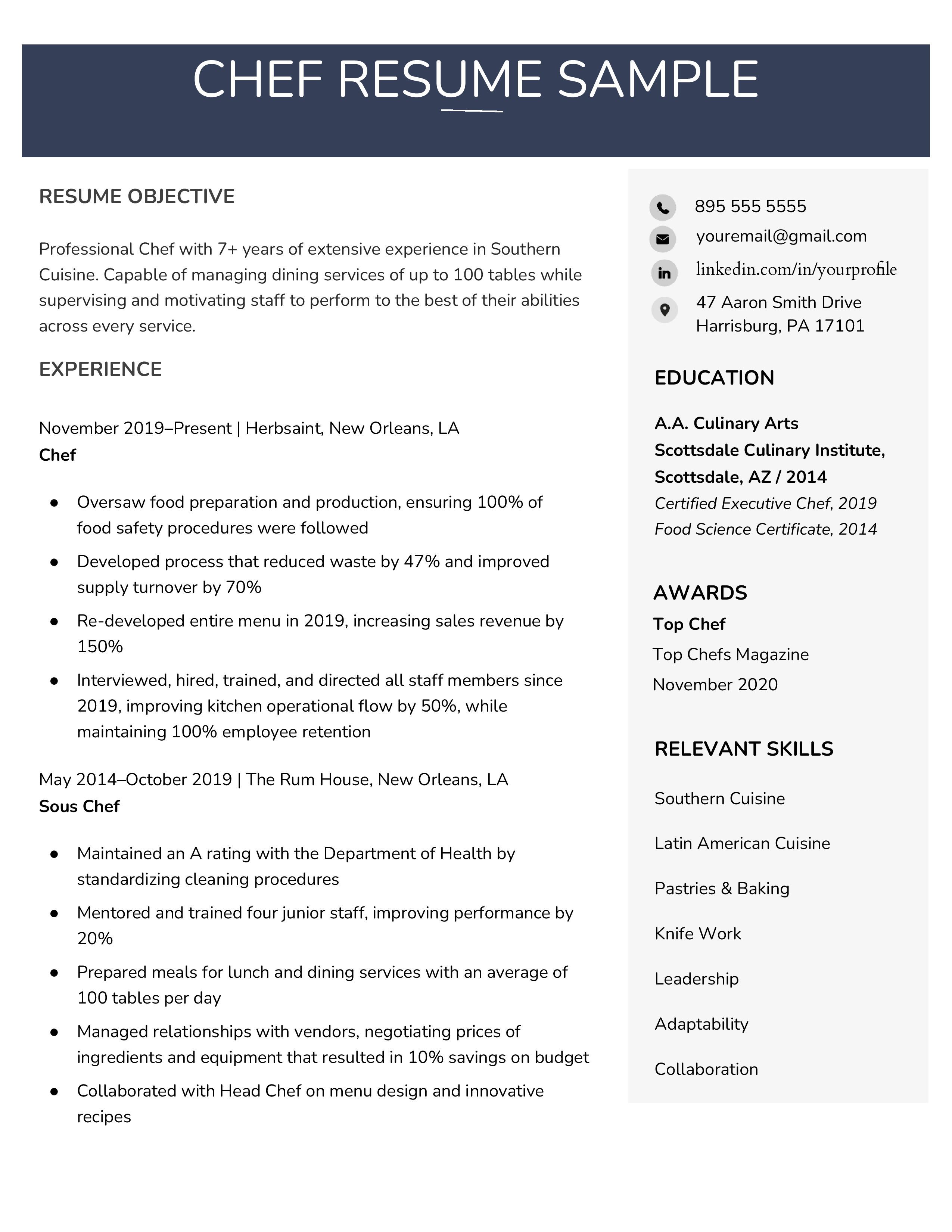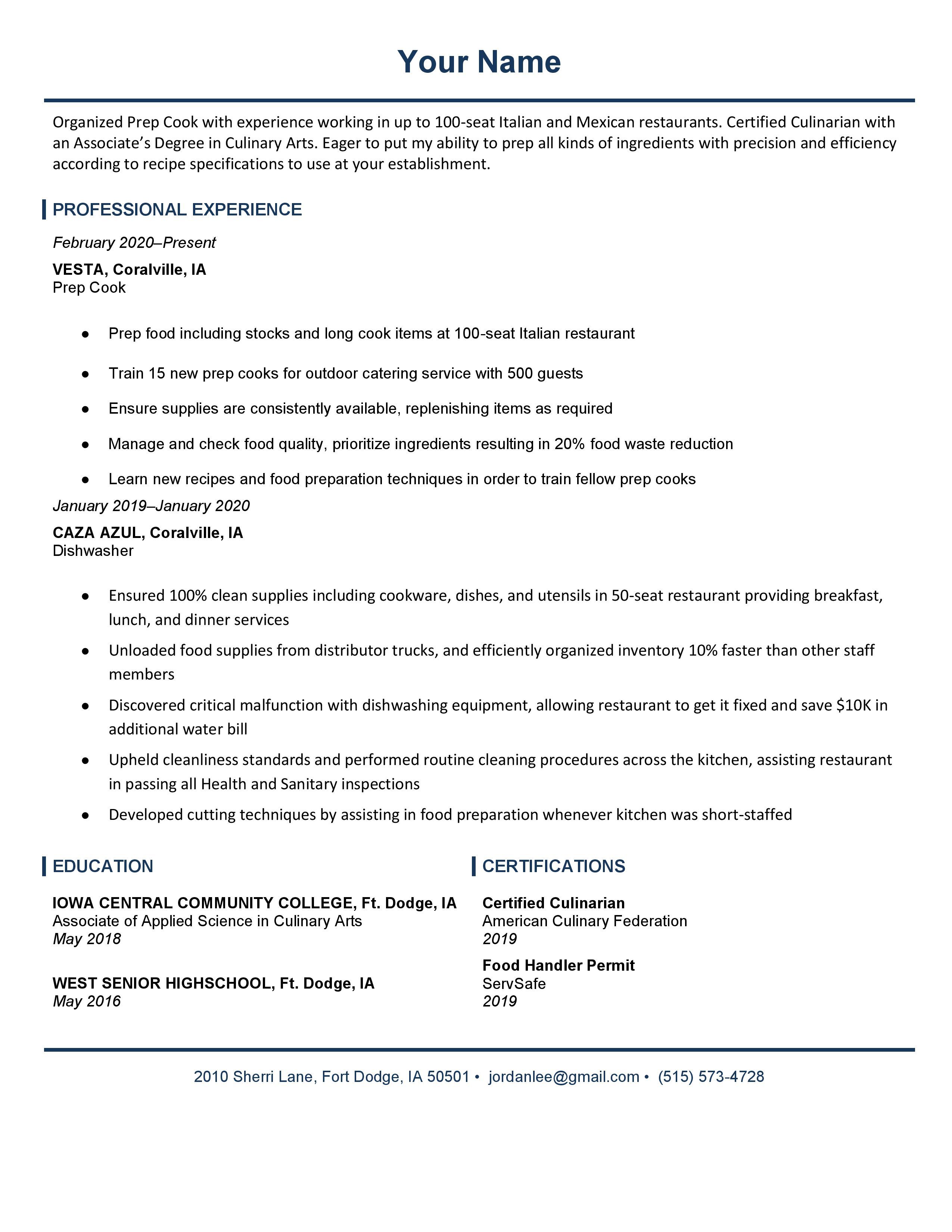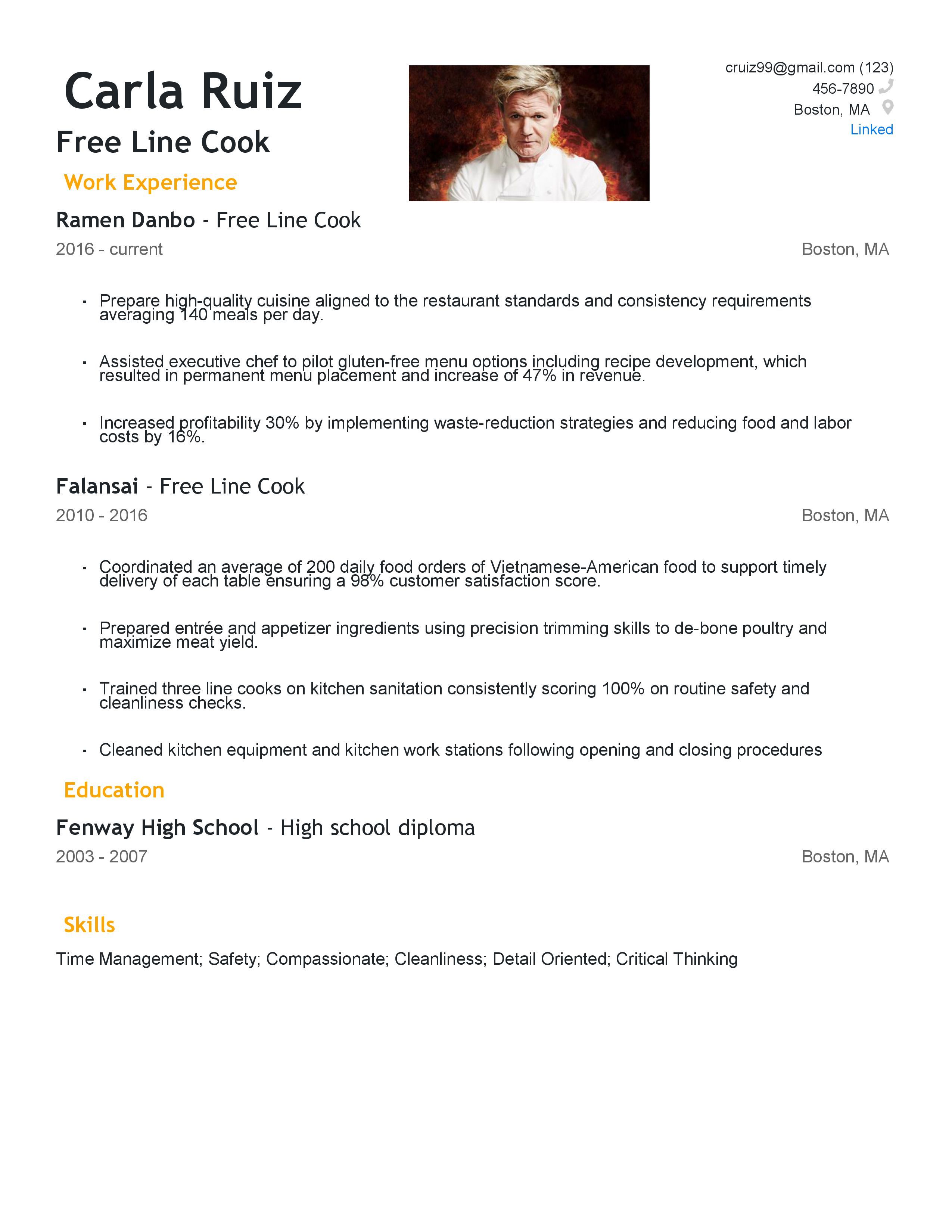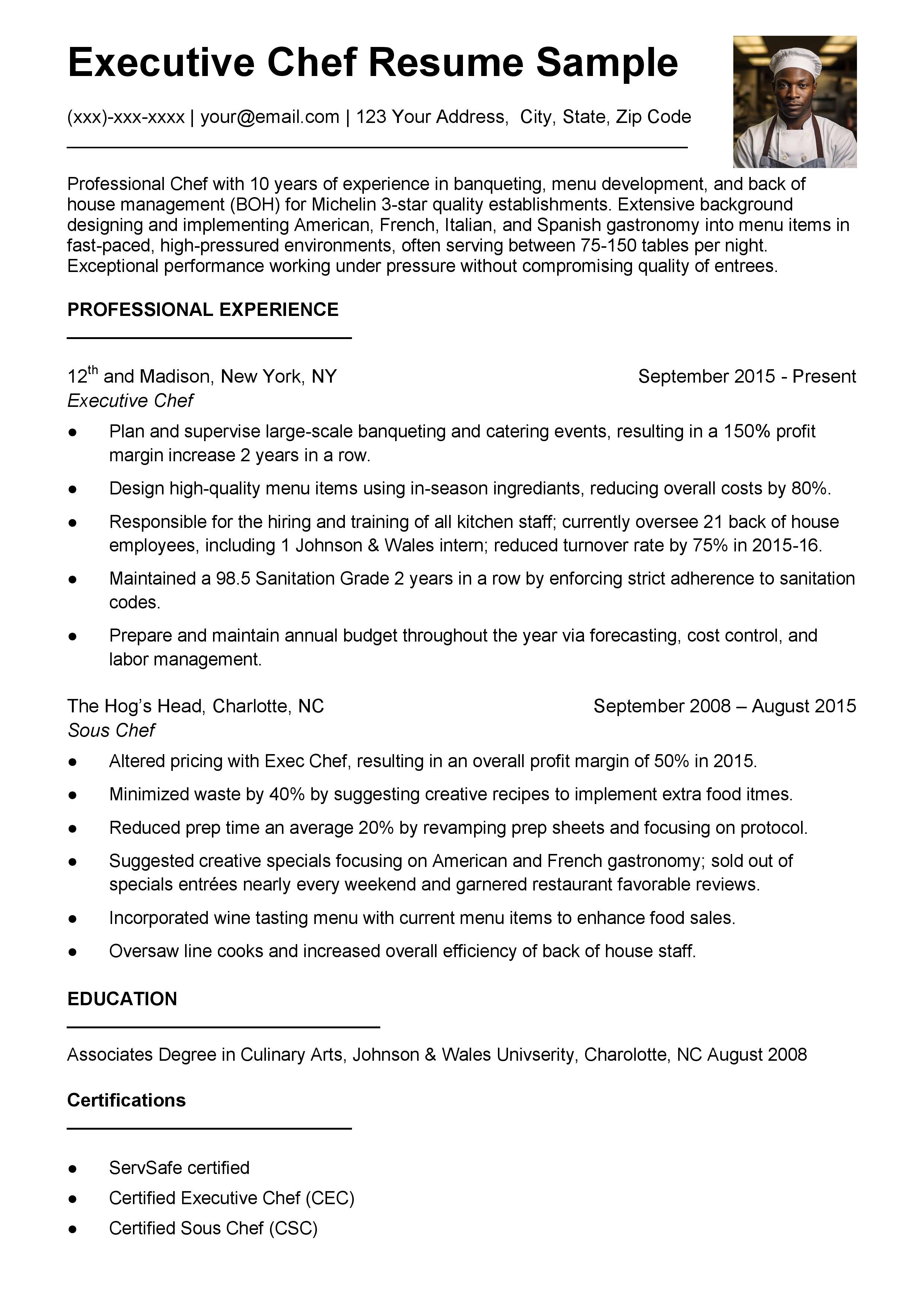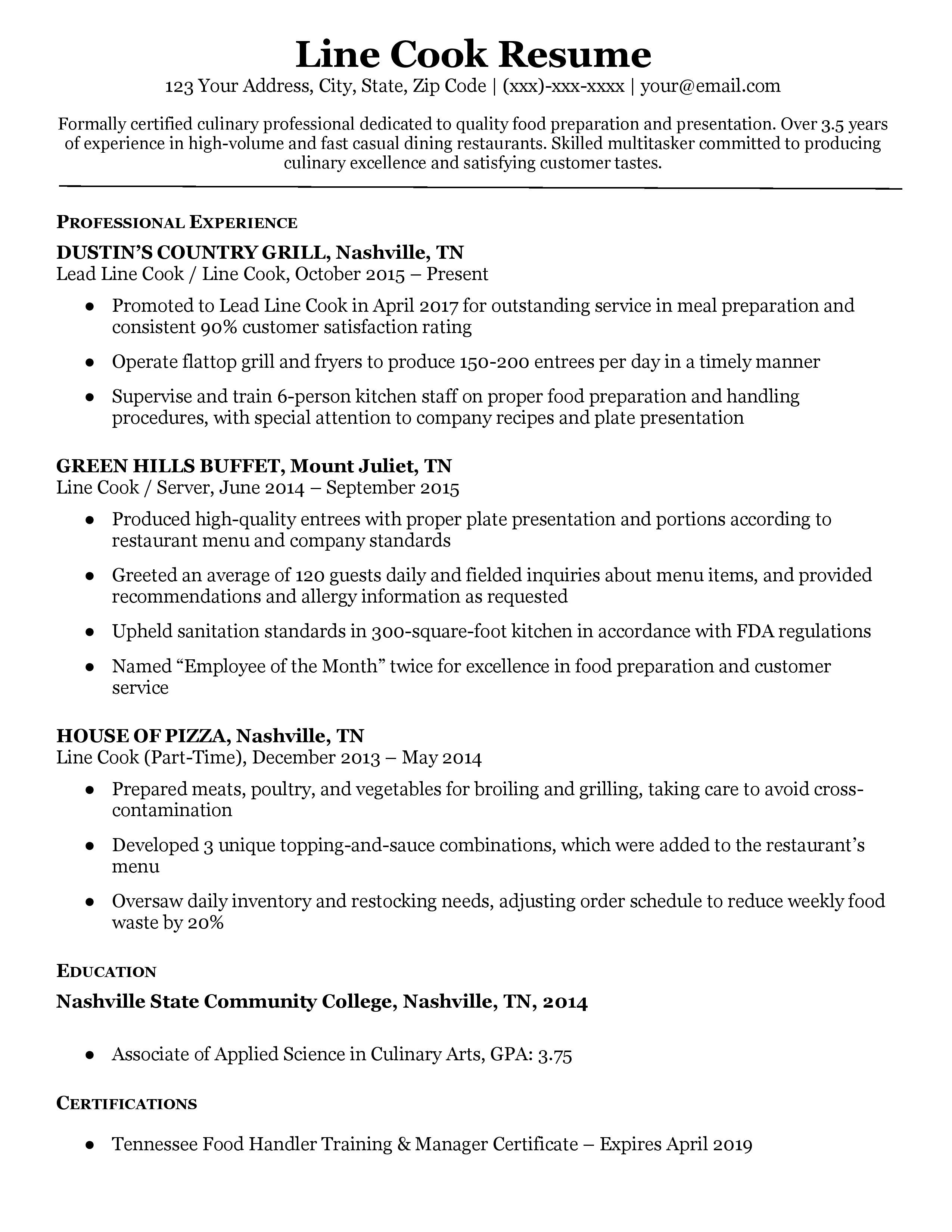Chef Resume: Expert Tips, Skills, and Sample Template
Published on September 30th, 2024
A chef's resume is a culinary work of art, just like the dishes they prepare. Whether in an executive chef position or fresh off the culinary school campus, this resume is the first opportunity to showcase skills, creativity, and passion in the kitchen. In an industry where presentation is vital, a lovely chef's resume can open doors to some of the best kitchens and restaurants in town.
This article will walk you through the key components of a strong resume for a chef, from highlighting your experience in the kitchen to providing formatting advice that will make your application stand out.
Responsibilities of Chef
- Design and regularly update menu items with seasonal offerings, trends, and customer preferences.
- Recipe formulation and taste tests Pooling activities in the kitchen to ensure a seamless workflow, especially during the peak season.
- These include shifts: scheduling of sous chefs, line cooks, and dishwashers.
- Teaching and mentoring junior staff and new staff members the general cooking techniques, plating, and kitchen protocols. Combinations.
- The menu should be balanced and varied with a list of appetizers, mains, and desserts as well as a variation between vegetarian and non-vegetarian dishes.
Check out free templates for chef resumes.
Template 1
Template 2
Template 3
Template 4
Template 5
Guidelines for Creating a Chef Resume
1. Correct Format of Resume
Your resume must be as polished as your cooking skills. Begin with the right format-clear, easy to navigate, and professional. There are three primary formats that you can use:
Chronological: Good for an experienced chef, this layout emphasizes your working history, and, as a result, puts your most recent jobs at the top. It is good to show consistent promotion up the hierarchy of a food service institution.
Functional: The functional layout is helpful for entry-level applicants or those who have gaps in a food-service working history. Emphasize what you know rather than what you have done. Highly emphasize your food training, key competencies, and relevant certifications.
Combination: This format draws attention to experience as well as skills, making it perfect for those who would like to focus both on their career development and technical know-how at the same time.
Choose the format that best suits your pattern of career and make sure it is clean and visually easy to look upon by using enough white space.
2. Write A Tasty Summary or Objective
Your resume summary, or objective if you are a newcomer, is the first thing an employer might glance at. Think of it as the amuse-bouche from your restaurant menu-an small impactful design to leave a good impression on the viewers.
A Summary works best for Experienced Chefs, characterized by years of experience, signature cuisines and leadership skills.
Example:
"Executive Chef with 12 years of experience in high-volume fine dining settings where creative menus could be adapted within the kitchen and staff managed to the fullest, with the best food quality. Experienced in Mediterranean and fusion cuisine."
3. Highlight Your Culinary Experience
For most chefs, work experience is the meat of a resume. Most job entries should illustrate what you did, as well as how you did it excellently. Bullet points shall be used to outline responsibilities and achievements, starting with action verbs such as "developed," "executed," "managed," or "oversaw."
Below is how to structure work experience:
Job Title: Specify what one did. Either Sous Chef or Line Cook.
Name of Restaurant and Location: If it's a known location or restaurant, you have to indicate the name and the location.
Employment Dates: Use the month/year format and provide both the start and end dates.
Key Responsibilities and Achievements: You need to highlight what you achieved rather than listing the work done. In doing so, focus on quantifying your achievements. For example:
"Designed and introduced seasonal menus with local ingredients that increased guest satisfaction by 20 per cent."
Even short or part-time experiences within the kitchens working as junior chefs would prove to be quite useful. Don't hesitate and just include the internships or any volunteer work in local food drives or the pop-up kitchens. This will show that you are serious about pursuing a career in the culinary world and at the same time, will provide hands-on training.
4. Highlight Skills
Here, you demonstrate your versatility at the stove. While a chef's resume is more 'hands-on' in experience, there are also some skills that no employer can forego. Consider using the following headings:
- Culinary Skills
Knife and food preparation techniques, cooking methods (sous-vide, grilling, etc.), menu planning, food presentation
- Management and Leadership
Supervise kitchen staff, scheduling, cost control and conflict resolution.
- Specialty areas: pastry arts, baking, international cuisines, dietary accommodations (vegan, gluten-free), and wine pairings.
- Technical skills: knowledge of food safety programs, inventory management software, and kitchen technology.
Remember to highlight a balance of hard and soft skills. Hiring managers want chefs who know the ins and outs of the kitchen but who also can rally a team, take well under pressure, and communicate clearly.
5. Relevant Certificate and Education
At this point, formal education or certificates become part of professionalism in a resume. If you have any relevant degree in culinary arts or have some other important certification from a well-known institute, you will add this over here. What you might include:
Education Background with Culinary School or Degree: Name of the school or college, location, and year you graduated.
Certifications: ServSafe, food handling certificates, or any other special training, such as a Certified Executive Chef (CEC) with the American Culinary Federation, for instance.
This is also a great place to put any sort of workshops, seminars, or other advanced cooking classes if you have attended any you are certainly showing further commitment to studying and progressing in your culinary career.
6. Volunteer Work and Honors
Recognition in the culinary industry goes a long way. Competition in cooking competitions or charity events and award rewards fall under this. Volunteering for food-related causes, such as cooking for shelter inhabitants or imparting culinary skills to other disadvantageous groups, also reflects your passion and community involvement.
7. Tailor Your Resume to the Job
There is no such thing as a one-size-fits-all resume. Every kitchen has its own energy, its own style of cuisine, and its own expectations. Whether you are applying to a high-end Michelin-starred restaurant or a trendy farm-to-table bistro, your resume should reflect the needs of the particular job.
For example, if you are applying for an Italian restaurant, focus on the fact that you know Italian food and making pasta and similar experiences. In case your position requires leadership, then be sure to describe and include a portion of your experience managing staff, budgets, and kitchen operations.
8. Conclude with Professional Design
Just as the plating of a dish might alter the way we perceive the dish, so does resume design. Professional typefaces read Arial, Calibri, or Times New Roman. Make it simple and easy to read. Steer clear of too many fancy elements and make sure sections are defined.
Final Words
In a competitive culinary landscape, your resume is a ticket to that coveted chef position. By carefully underscoring your experience, skills, and education, you'll stand out before hiring managers searching for talented chefs who can bring more than just great cooking to the table. After all, your resume is your brand as a chef. So ensure it's tailored and professional and filled with the flavor that makes you unique.
Authors

Yash Chaudhari
With a strong background as an SEO and Content Specialist, Yash excels in driving organic traffic, improving search engine rankings, and creating SEO-optimized content. He has a proven track record of implementing strategies that increase website traffic and conversions. Additionally, Yash is an automotive enthusiast and has a keen interest in astronomy.
Hire the best without stress
Ask us how
Never Miss The Updates
We cover all recruitment, talent analytics, L&D, DEI, pre-employment, candidate screening, and hiring tools. Join our force & subscribe now!
Stay On Top Of Everything In HR

